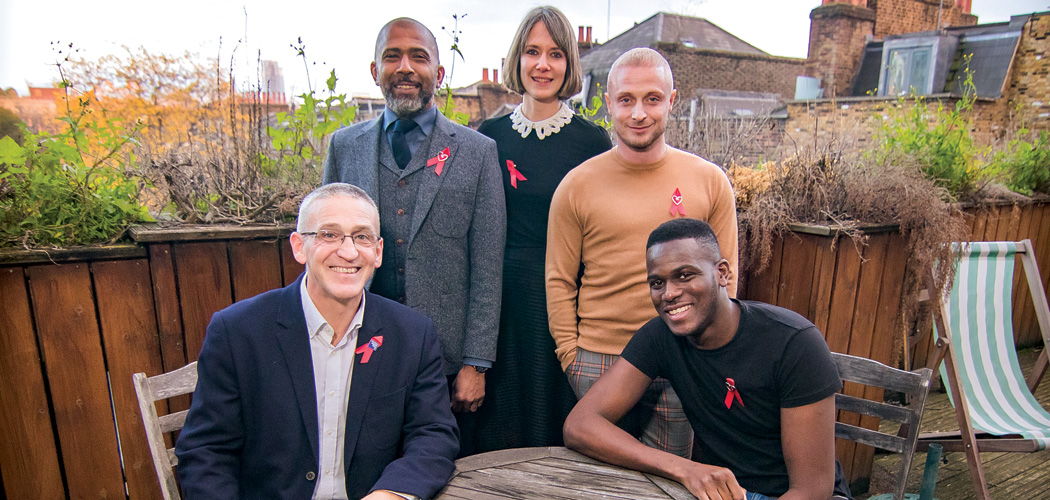Why is it important to aim for zero transmissions among gay and bisexual men? And what are the hurdles to achieving the elimination of HIV transmission? These are two crucial questions here in 2018 as we see dramatic falls in new HIV infections amongst gay men. To help answer these questions, we met up with some of the team from Terrence Higgins Trust, the UK’s oldest HIV and AIDS charity, and now at the forefront of getting to #ZeroHIV, its campaign message for this year’s World AIDS Day.
Ian Green
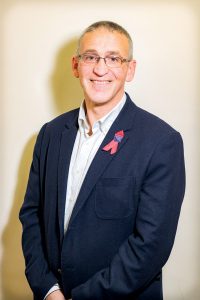
Can you tell us about your work and what you do for Terrence Higgins Trust?
I work as Chief Executive at Terrence Higgins Trust, and came into post back in 2016.
My role is to oversee all aspects of the charity – from fundraising, to communications to operations – and work alongside our Executive team and the Board of Trustees to ensure we are meeting our aims and objectives and working efficiently as a charity.
Why is it important to aim for zero transmissions among gay and bisexual men?
This is the group most disproportionately impacted by HIV, and we also know what works in terms of reducing transmission within this community.
As well as reducing transmission however, we also want to ensure we are there to support people living with HIV in the LGBT community, from those who are newly diagnosed to those who have been living with the virus long term and still need our support. This becomes more challenging as the funding for support services reduces.
What do you think are the hurdles to achieving the elimination of HIV transmission?
I think it’s a combination of things. Resource is a huge factor. We’re currently experiencing a sexual health crisis and, while sexual health services continue to experience funding cuts, this isn’t going to improve.
At the same time there’s still so much stigma that surrounds even visiting a sexual health clinic and/or taking an HIV test. This stigma can induce fear that prevents people from being tested, and that not only means that individuals may be unknowingly living with HIV and not on treatment, but also that they could be passing it onto partners.
Condoms, treatment as prevention (U=U), regular testing and PrEP are the tools we need to end HIV transmission, and anything that stands in the way of those things presents a barrier to ending HIV.
PrEP for example, must be routinely commissioned on the NHS for everybody who needs it, and we must find a way of ensuring all groups know about it and how to access it. While there is a growing demand among gay and bi men, there are other communities including those most at risk of contracting HIV, who have little knowledge of the drug or how to access it.
Phil Samba
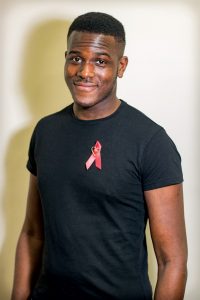
Can you tell us about your work and what you do for Terrence Higgins Trust?
I work as a health improvement specialist for black, Asian and minority ethnic men who have sex with men. I conduct digital outreach using dating apps, social media and digital ads, I conduct physical outreach at events, and I run workshops. I promote all HIV prevention tools such as condoms, treatment as prevention, and PrEP whilst also distributing and promoting free and confidential postal HIV self testing kits. I then conduct research on all my activity to inform best practice for their sexual health needs.
Outside of Terrence Higgins Trust, I’m a social activist who educates and advocates for PrEP and raises awareness of it as well as develops and appears in campaigns specifically targeted at queer men of colour. I’m a writer sharing my perspective of being a young, gay, black, African man living in London and I use my social media as a way to interact with men of colour about their sexual health.
Why is it important to aim for zero transmissions among gay and bisexual men?
I think it is important to aim for zero transmissions among gay and bi men because since the 1980s they have remained the group most at risk of HIV worldwide but it’s also important to remember that within this group is a subgroup disproportionately affected by HIV the most – queer black men of African descent, particularly young black men.
There are also other demographics such as other queer Latino men, queer South East Asian men, some sex workers, trans men and women and black African heterosexual men and women. It is important to aim for zero transmissions across all of these demographics.
What do you think are the hurdles to achieving the elimination of HIV transmission?
I think the hurdles to achieving the elimination of HIV transmission are the continuous cuts to public health and there needs to be a national rollout of PrEP on the NHS.
We need to not only get more people to test for HIV but to test regularly, there’s also stigma, concerns about confidentiality during HIV testing or treatment and the lack of targeted HIV prevention campaigns for certain demographics that need to be addressed. Mental health needs to be taken into consideration; negative mood states have been associated with heightened sexual risk taking. I can say from my own experiences that poor mental health leads to poor sexual health. There needs to be syndemic and holistic approaches to sexual and mental health.
Greg Owen 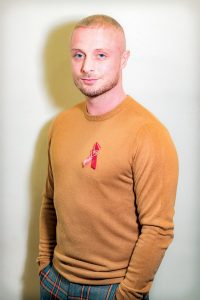
Can you tell us about your work and what you do for Terrence Higgins Trust?
I co-founded iwantPrEPnow (IWPN) a website which facilitates the safe purchase of genuine generic PrEP. PrEP is a medication taken before and after sex which offers almost 100% protection from HIV. IWPN is now part of Terrence Higgins Trust, I continue to run and manage IWPN as Project Lead. I develop new PrEP components of Terrence Higgins Trust’s health improvement services which includes delivering training/education for third sector and clinical professionals and communities. This year I integrated more with the health improvement team so I support additional projects which are not directly under my remit. I have a very public facing role which entails a lot of media.
Why is it important to aim for zero transmissions among gay and bisexual men?
It is important to aim for zero HIV transmissions for everyone, not just gay and bi men. I think it’s worth pointing out what our HIV epidemic looks like here in the UK, to help people understand what we talk about when we say “gay and bi men are disproportionately affected by HIV”. Until very recently approximately half of all HIV diagnoses occurred in gay and bi men but we only make up about 3-5% of the population. That’s starting to change with gay and bi men testing regularly, starting HIV treatment early to become undetectable which means they can’t pass on the virus and of course PrEP. Over the past two years HIV rates in gay and bi men have started to drop. We need to step up our efforts and do the extra work to ensure that we see similar results in women and other people. Paying attention to intersectionality is going to be key.
What do you think are the hurdles to achieving the elimination of HIV transmission?
If I’m being honest, I think apathy, indifference, lack of political will and cuts to services are the biggest threats to the global elimination of HIV. I was recently reminded of a Marsha P Johnson quote, “No pride for some of us without liberation for all of us”. Our response to HIV needs to be a global initiative. Half of people living with HIV globally don’t have access to life saving treatment. Stigma is a killer too and directly correlates to HIV incidence.
Marc Thompson
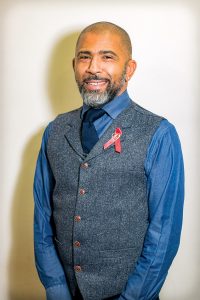
Can you tell us about your work and what you do for Terrence Higgins Trust?
I’m the strategic lead for health improvement at Terrence Higgins Trust. My role is to ensure our health improvement and health promotion work, all the things we do to end HIV and improve poor sexual health – our campaigns and resources, our outreach into communities and online – is innovative and creative, fit for purpose and really meets the needs of people at risk of HIV and poor sexual health.
Why is it important to aim for zero transmissions among gay and bisexual men?
There is a global move to end HIV and ending HIV among gay and bi men is central to achieving this. It’s important, as without ending HIV among gay and bi men we won’t end HIV anywhere.
Gay and bi men have carried the burden of the HIV epidemic in the UK for over 30 years. HIV has hung over us for way too long and this has had a significant impact on our community, on our collective sense of who we are and what defines us. We saw record numbers of gay men diagnosed with HIV up until 2015 but the last two years has seen a real change with the numbers of newly diagnosed men dropping for the first time. This is great news and a move in the right direction to getting to zero transmissions among gay and bi men.
What do you think are the hurdles to achieving the elimination of HIV transmission?
Well the good news is we are moving in the right direction. We continue to see dramatic drops in new diagnosis among gay and bi men, so we have some of the tools to end HIV transmission. Gay and bi men continue to test and test regularly, men who are diagnosed HIV+ start treatment early and become undetectable, which means they cannot pass the virus on. Fun Fact: Did you know that 97% of people diagnosed with HIV are on treatment and have an undetectable viral load? But we can still do more. Although testing is easy, free and confidential, stigma still stops some people from getting tested. So we need to address HIV stigma and let people know what it really means to be diagnosed HIV+ in 2018 and that you will live a full and healthy life.
And then there’s PrEP. Several studies from around the world, most recently in Australia, have shown that providing PrEP to those that need it will have an impact in reducing new HIV transmissions. PrEP still isn’t available in England for free on the NHS. I have no doubt that full provision of PrEP on the NHS will have big impact on getting to zero new transmissions in this country.
Debbie Laycock
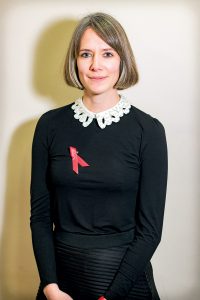
Can you tell us about your work and what you do for Terrence Higgins Trust?
I head up our policy and public affairs work at Terrence Higgins Trust. For a national charity, our team is tiny but we punch above our weight! We are responsible for identifying issues that affect people living with or at risk of HIV (and broader sexual health) and working to tackle those issues. We work closely with other charities and spend a lot of time in and out of Parliament and the Welsh Assembly meeting parliamentarians. We always have a number of policy areas on the go at any one time – from big issues like sex education, PrEP and funding that can take years to change, to specific cases of discrimination that have been reported to us from Terrence Higgins Trust service users.
Why is it important to aim for zero transmissions among gay and bisexual men?
Gay and bisexual men are still disproportionately affected by HIV. Yet, of all community groups – we know the most about what works to prevent HIV in gay and bi men. We have the opportunity to end HIV transmissions in this community. And as a country, we cannot, and should not, let that opportunity pass us by. I want to see the UK be the first country to end HIV infections. Although we have to fight to keep HIV on the political agenda, we are grateful for the support of incredible MPs and peers – Stephen Doughty, Norman Lamb, Lord Guy Black to name but a few – who are helping to make the case for why national and local governments must redouble efforts to tackle HIV. But it is not just about HIV prevention, a priority for us is to also work to ensure that people living with HIV are supported to live well and experience no HIV-related discrimination.
What do you think are the hurdles to achieving the elimination of HIV transmission?
The fight continues. No UK countries have committed to zero HIV targets, and there are no national HIV strategies in England and Wales to work towards ending HIV infections. It is a disgrace that we still don’t have PrEP on the NHS in England, that individuals who have been turned away from the PrEP trial are being diagnosed with HIV. Whilst demand for sexual health services is rising, we are seeing sexual health clinic budgets in England being cut by 25%, and some areas of Wales still have no sexual health service. We must make sure that statutory relationships and sex education includes quality information on HIV. There is much to do but I am convinced the momentum is with us.
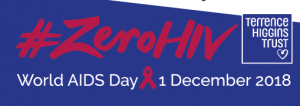
For more information about Terrence Higgins Trust’s work and their support services go to tht.org.uk



